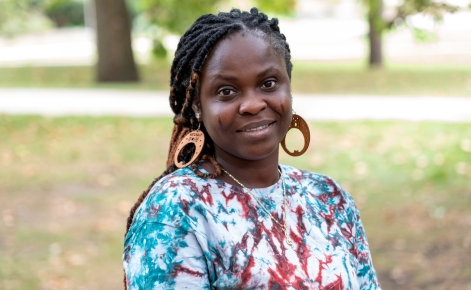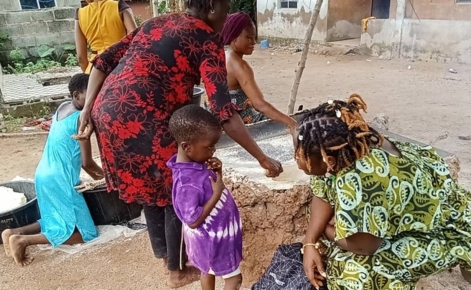Michigan State University doctoral candidate Yétúndé Alábedé conducted a five-week research trip in Nigeria where she explored the language practices of migrant communities in summer 2024. Each year, the Alliance for African Partnership Fellowship supports graduate students’ academic research in Africa and fosters collaboration between African institutions and MSU.

Alábedé, a fourth-year Ph.D. candidate in the Curriculum, Instruction and Teacher Education program, examined how multilingual, migrant families in rural Nigeria navigate the preservation of their heritage language, Igede, while engaging with the dominant language of the environment, Yorùbá, and English, the official language.
She collaborated with migrant families in Aparadija Gbarago Village, examining how family, school and community interactions influence children’s language use and development.
“Many of these families live in environments where other languages are spoken, and I want to understand how this affects their children’s schooling and social interactions.” said Alábedé, a native Yoruba speaker who was born and raised in Nigeria.
In the rural Nigerian community she studied, children often walk about 30 minutes to reach the nearest school, and some do not attend regularly due to family obligations, such as working in the farm fields, financial reasons or going to the market to sell their produce.
“Children in these communities are losing touch with their native languages at home,” she said. “I want to understand how this impacts their sense of cultural identity and their educational outcomes.”
During the fellowship, Alábedé collaborated with professors and mentors at the Federal College of Education in Osiele, Abeokuta, where she is also an alum of. These partnerships were essential for gaining access to the migrant communities and ensuring the success of her fieldwork.

Her work in Nigeria is part of her larger dissertation research, which examines language practices in both Nigerian and diaspora communities in the United States, United Kingdom and Canada. Through her studies, she seeks to understand how African heritage languages, particularly Yorùbá, are maintained or lost over time.
“The AAP Fellowship allowed me to go back to engage directly with the communities I’m studying,” said Alábedé. “It’s an incredible opportunity for any student looking to conduct meaningful research in Africa.”
Language as a gift
As part of her dissertation, Alábedé developed a theoretical framework she calls Ebùnlingualism, which translates to “Language as Gift.” This concept centers language as a cultural inheritance that parents pass on to their children. Her work encourages educators and policymakers to view multilingualism as an asset rather than a barrier to learning especially for African families where multilingualism is the norm.
Alábedé hopes her research will contribute to language policy discussions in both Nigeria and the U.S. “In practice, English often takes precedence, and local languages are sidelined,” she said. “I hope my research will provide additional evidence to support the implementation of existing policies and encourage the development of new ones that better support multilingual students.”
Looking ahead
Alábedé came to the U.S as a Fulbright Scholar in 2018-2019 to teach Yorùbá. Since joining MSU, she credits her advisor, Associate Professor Sandro Barros, with encouraging her to pursue research that aligns with her passion and joy.
As she continues to analyze her findings, Aláb?dé plans to publish her research and present her work at academic conferences. “My research is still evolving, but I’m excited about the potential impact it could have on language policy and education in both Nigeria and the diaspora,” she said.
This story originally appeared on the College of Education website.